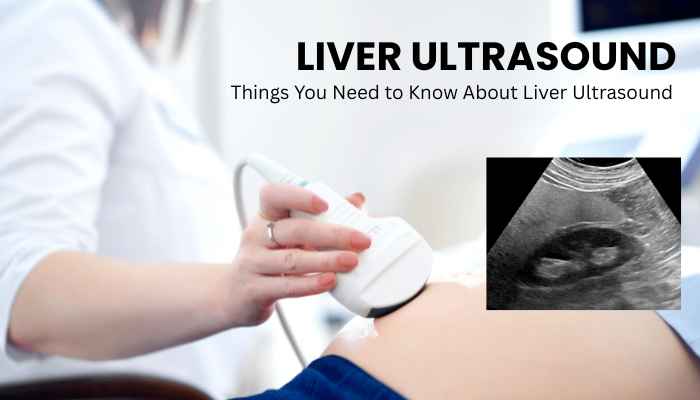An ultrasound scan is sound wave imaging to scan the workings of body organs. It is also known as USG or sonography.
A liver ultrasound scan is a specific radiology examination under nuclear medicine. It is applied for identifying certain conditions of the liver or determining the function of the liver. It is applied also for verifying the response of certain conditions to treatment. It is also referred to as a liver-spleen scan because the spleen is also investigated due to its functional intimate relation to the liver.
Generally, the question is, why does the doctor suggest a liver ultrasound? What is the process and preparation? And what are the risk factors as well as advantages? So, in this blog, we will tell you each question that comes into your mind when the doctor suggests you for a liver ultrasound.
Why Would a Doctor Suggest a Liver Ultrasound?
There are several reasons for your doctor to suggest a liver ultrasound:
- To diagnose diseases such as liver cancer, cirrhosis of the liver, hepatitis, cysts of the liver, tumors, cysts of the spleen, etc.
- In order to evaluate the condition of the liver and/or spleen after unexplained abdominal pain.
- To assess the status of the liver and spleen following abdominal trauma.
- The ability to see the enlargement of the liver or spleen.
- To assess response to therapy for liver issues.
- To monitor the course of liver disease.
- To identify portal hypertension and many others.
What Are the Advantages of a Liver Ultrasound?
When your physician orders a liver ultrasound, then when you have it done, your doctor will use your radiology report to make an important decision for your diagnosis to go on to the next treatment. Having proper tests gives assistance in properly evaluating the disease. It is also beneficial for your physicians to check whether follow-up treatment or screening is required and whether it’s progressing or not. If you are experiencing anxiety regarding your test, a precise liver ultrasound provides an excellent means of gaining further insight into your diagnosis and reassurance.
Process of Liver Ultrasound
We will now outline the procedure step by step. Usually, the following procedure is done:
- The liver ultrasound itself is not painful. But staying still for an extended period of time for the whole procedure may result in some pain or discomfort. Hence, the technician will typically utilize all available measures of comfort to complete the procedure as soon as possible and minimize any pain or discomfort.
- The technician will instruct you to undress and wear a patient gown.
- You will be asked to remove any metal items such as jewelry, dentures, watches, hairpins, bracelets, etc., that could interfere with the procedure.
- The technician will place an intravenous (IV) line in your arm or hand for the radionuclide injection.
- Following the administration of the radionuclide into your vein, you will be requested to wait since the radionuclide will be permitted to accumulate in the liver tissue for at least 30 minutes.
- As the scanner orbits, you will be requested to remain extremely still on the scan table by a technician because motion during scanning may shift the scan quality.
- To capture the gamma rays being released from the radionuclide inside the tissues of the liver, the scanner will be positioned over the upper right quadrant of the abdomen.
- To get images of all the liver’s surfaces, you might be asked to move during the scan.
- The IV line will be pulled by the technician once the scan is complete.
What Are the Preparations That Are Needed for a Liver Ultrasound?
The test preparations differ according to the part of the body that is being examined. Now we will discuss the general preparation for the test:
- If you are pregnant or if you are considering family planning, kindly let the technician know and kindly see your doctor prior to making an appointment.
- If you are lactating, then inform the technician prior to booking a scan due to the possibility of contaminating the breast milk with the tracer.
- You will be asked to undress and wear a patient gown and also to remove all piercings and metal objects because they may disrupt the procedure.
- No sedation or fasting is needed prior to a liver scan.
- If you have any allergies or sensitivity to medications, iodine, or contrast dye, please do not forget to let the technician know before the exam.
- According to your medical history, the physician can order special preparation.
Risks Involved in Liver Ultrasound
There are no long-term risks involved. But in certain situations, some short-term risks can happen, such as
- Allergic reactions to the radionuclide are uncommon, but in certain patients, they can happen.
- Pain or discomfort due to prolonged recumbency for the scan.
Aftercare of Lung Ultrasound
- In order to prevent any dizziness or headache, get up slowly from the scanner table.
- For roughly 24 hours following the procedure, drink plenty of liquids and urinate frequently to clear the remaining radionuclide from your system.
- If you feel any pain, redness, or swelling at the IV site after your procedure, you should report it to the technician/doctor.
Conclusion
A liver ultrasound is a scan that is used to see the abnormalities in the liver by using sound waves. It is a specific radiology examination under nuclear medicine. It helps to determine the functioning of the liver. Understanding the need, recommendations, advantages, and risk involvement is as important as understanding the side effects of ultrasound. Information can help you to prepare for the liver ultrasound.
Frequently Asked Questions
Q. Is fasting compulsory before the liver ultrasound scan?
Yes, fasting is recommended by healthcare providers. At least 6-12 hours prior to the procedure.
Q. What are the other names of ultrasound?
Ultrasound is also known as sonography or ultrasonography.
Q. How to book a liver ultrasound online?
To book a liver ultrasound online, you can go through Carebox; here you can easily find the best imaging center near you. Click here to book your liver ultrasound in just 4 easy steps.
Q. Can I drink water before the liver ultrasound?
You should ask your healthcare provider if you should or shouldn’t drink water prior to a liver ultrasound because it will influence how accurate the scan will be, particularly if it is assessing liver stiffness.
Q. How long does a liver ultrasound take?
An ultrasound of the liver takes around 15-30 minutes, and it also depends on other factors.


